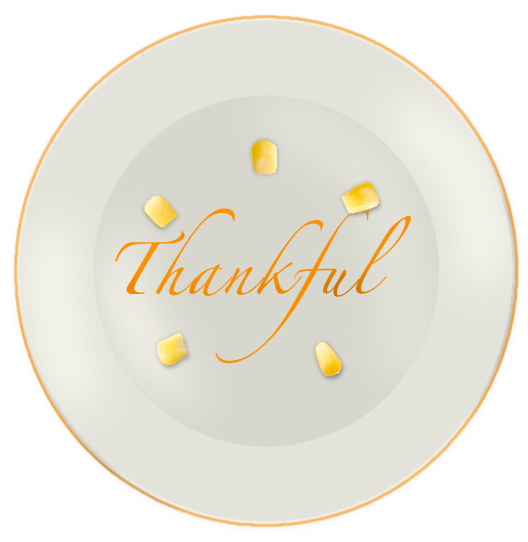 Five kernels of corn – that is what has been reported that
he Pilgrims were served on the second
Thanksgiving Day, 1623, just before the larger meal was dished up.* When we
talk about the first Thanksgiving Day–with the Pilgrims and Wampanoag tribe of Native
Americans sharing a meal of thankfulness after harvesting their crops–that event
was held on November 28, 1621. The second Thanksgiving Day happened two years
later. It may have been a better day to represent Thanksgiving.
Five kernels of corn – that is what has been reported that
he Pilgrims were served on the second
Thanksgiving Day, 1623, just before the larger meal was dished up.* When we
talk about the first Thanksgiving Day–with the Pilgrims and Wampanoag tribe of Native
Americans sharing a meal of thankfulness after harvesting their crops–that event
was held on November 28, 1621. The second Thanksgiving Day happened two years
later. It may have been a better day to represent Thanksgiving.
After
the first Thanksgiving in 1621, two things happened that caused great hardship
for the community living at Plymouth. First, they underestimated how much food
to save for the winter and they ran out of grain before spring. They saved just
enough grain to plant their fields during 1622. However, they had a communal
agreement where everyone would share food equally from a common food pantry.
This caused a great many people to slack off when it came time to tend to the
fields. They left that hard work to someone else. Slothfulness became epidemic.
As a result, their corn harvest was diminished and they faced another lean
winter as food ran out once again. Grain was rationed to a few kernels of corn
per day. Stealing food in the dark of night became a problem in the colony.
William
Bradford, the governor of Plymouth Colony decided to make a change. In the
spring of 1623 he announced that he was canceling the communal living
agreement. In its place, he parceled out land for each family and announced a
private land ownership agreement. The families were free to do whatever they
deemed fit on their own land. They could plant as little or as much as they
wanted. If they had more than they needed, they were free to keep it, trade it,
sell it or whatever they deemed fit. However, there would be no more public
handouts! Bradford’s plan worked! He reported that men and women who had
previously shirked working in the fields took to planting and tending their
fields. Crops were growing in larger quantities than either of the previous two
growing seasons.
Then
adversity happened. The summer months of 1623 were exceptionally hot. Starting
in June, it did not rain for six weeks and their crops began to wither and turn
brown. In the middle of July, Bradford called for a day of fasting and prayer.
The Pilgrims spent nine hours one hot July day praying for God to send rain. In
the evening, the skies became cloudy and it began to rain. Bradford wrote about
the day they prayed for rain.
For all the morning and the greatest part of the day, it was
clear weather and very hot, and not a cloud or any sign of rain to be seen; yet
toward evening it began to overcast, and shortly after to rain with such sweet
and gentle showers as gave them cause of rejoicing and blessing God…It came
without wind or thunder or any violence, and by degrees in that abundance as that
the earth was thoroughly wet and soaked … which did so apparently revive and
quicken the decayed corn and other fruits as was wonderful to see, and made the
Indians astonished to behold.1
The
rain lasted for two weeks, reviving the crops. So when the harvest came in the
fall of 1623, they had more food than they had in the previous two years. When
they sat down for the second Thanksgiving meal, they had a change of attitude
due to their new perspective. Five kernels of corn reminded them of their
blessings.
- One kernel to remind
them of the blessings of health
- One kernel to remind
them of the blessings of family
- One kernel to remind
them of the blessings of friends who lent a helping hand
- One kernel to remind
them of the blessings of faith and hope beyond what is seen with human eyes
- One kernel to remind
them of the blessings of work so one could earn their daily bread
Make sure you take time to count your blessings on this
Thanksgiving Day.
______________________
1. Of Plymouth Plantation, 1620-1647, by William Bradford,
translated by Samuel Eliot Morison. As quoted in The Pilgrims &
Capitalism Part II: What to Remind Yourself Every Thanksgiving. Triple
Check.com, November 24, 2011
*Note: The five
kernels of corn tradition may have actually been started by Daniel Webster at a
Pilgrim Society event on December 22, 1820, nearly 200 years after the Pilgrims
celebrated Thanksgiving. See Five Kernels
of Corn, by Susan E. Roser, The Mayflower Quarterly,
October 19, 2005
The
tradition may also be attributed to a poem by 19th century writer Hezekiah Butterworth, The
Five Kernels of Corn